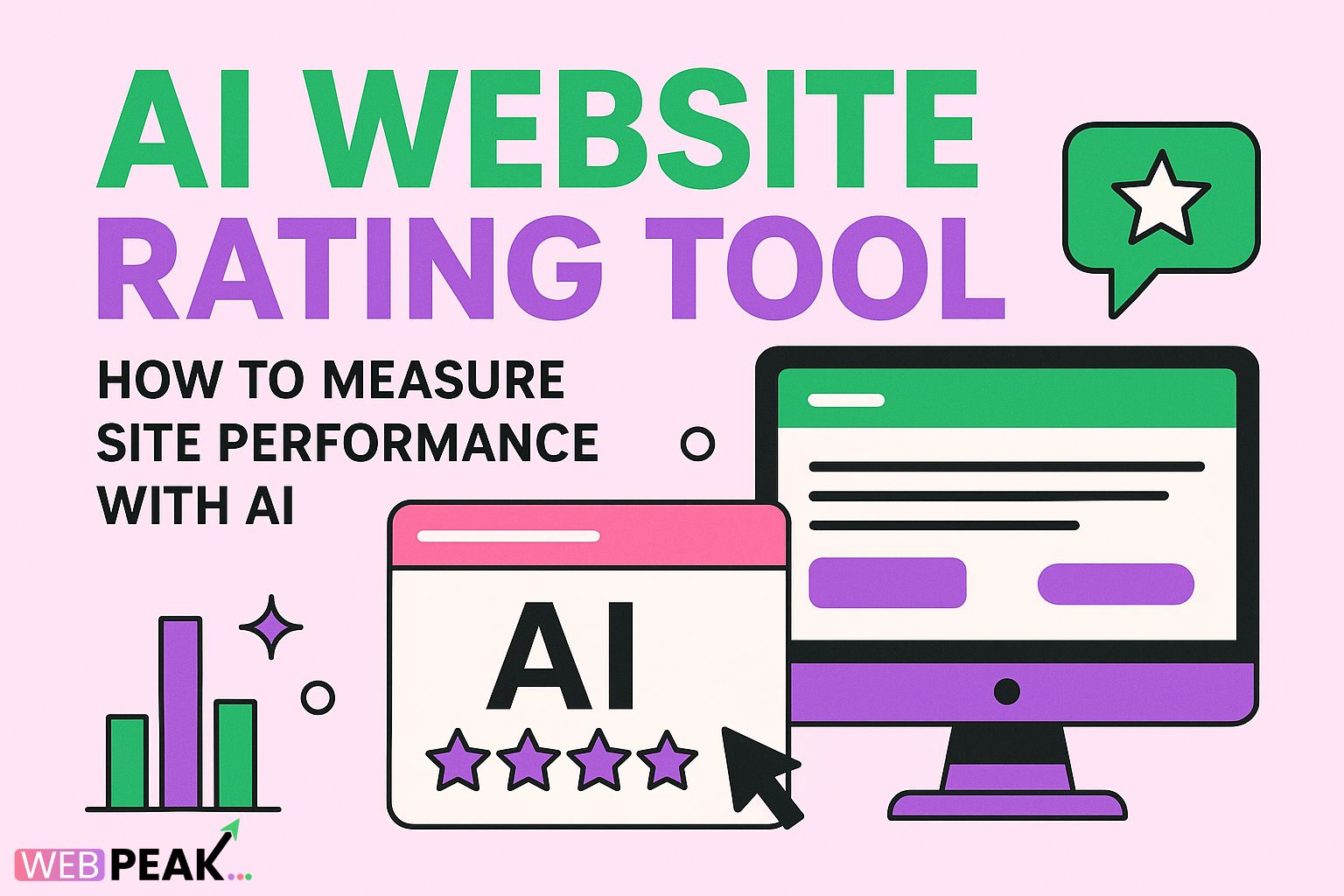AI Website Rating Tool: How to Measure Site Performance with AI
In today’s data-driven digital landscape, understanding how your website performs is no longer a luxury—it’s a necessity. Businesses rely on accurate performance evaluations to improve rankings, increase conversions, and elevate user experience. This is where an AI website rating tool becomes essential. Within the first few minutes of analysis, AI can uncover hidden issues and opportunities that would otherwise demand hours of manual auditing. As AI continues to reshape the digital world, using automated website evaluation tools has become one of the most effective ways to optimize online presence.
This guide explores how AI-powered website rating tools work, why they matter, what metrics they evaluate, and how you can use them to boost search visibility and overall site success. Whether you’re a beginner or an advanced marketer, you’ll find actionable insights and an SEO checklist to ensure you use AI to its fullest potential.
What Is an AI Website Rating Tool?
An AI website rating tool is a digital platform that analyzes a website’s performance using machine learning algorithms, pattern recognition, and large-scale data models. Instead of simply reporting basic statistics such as loading speed or keyword usage, AI tools interpret the data and provide insights rooted in predictive analysis. They help website owners pinpoint specific issues and recommend improvements that increase usability, accessibility, and search engine ranking.
How AI Enhances Traditional Website Audits
Traditional audits rely heavily on human evaluation, which is time-consuming and prone to oversight. AI improves this process by:
- Processing large datasets instantly.
- Identifying optimization opportunities across technical, content, and UX areas.
- Providing data-driven recommendations tailored to industry standards.
- Continuously learning from user behavior and algorithm updates.
In short, AI helps websites stay compliant with ranking factors and adapt quickly to search engine updates.
Why Website Performance Ratings Matter
Your website’s performance impacts multiple aspects of digital success—from SEO visibility to user satisfaction and conversion rates. If your site is slow, confusing, or poorly optimized, search engines penalize it and users bounce away. AI website rating tools help ensure your site offers the best possible experience.
Key Benefits of Using an AI Website Rating Tool
- Faster Audits: Get deep insights within seconds.
- More Accurate Data: AI reduces human error in website evaluations.
- Clear Priorities: AI ranks issues based on their impact on SEO and usability.
- Predictive Insights: Tools forecast how changes will influence your rankings.
- Better UX Optimization: Identify friction points in user journeys.
- Full-Spectrum SEO Monitoring: From technical errors to content quality, AI covers everything.
Core Metrics Evaluated by AI Website Rating Tools
AI tools examine multiple categories of performance to build a complete picture of your site’s health. Below are the most important metrics they evaluate:
1. Technical SEO Performance
Technical SEO remains the backbone of website visibility. AI tools evaluate:
- Page speed and Core Web Vitals
- Mobile responsiveness
- XML sitemaps and indexability
- Broken links and redirects
- Server performance and hosting issues
- Structured data implementation
2. On-Page SEO and Content Quality
AI checks whether your content aligns with user intent and ranking signals. It examines:
- Keyword optimization
- Content depth and clarity
- Readability levels
- Duplicate and thin content
- Title and meta tag optimization
- Engagement metrics
3. User Experience (UX)
AI algorithms track user interaction patterns to evaluate overall experience. Common UX metrics include:
- Bounce rate and session duration
- Navigation structure
- Mobile usability
- Accessibility compliance
- Layout responsiveness
4. Security and Trust Factors
Search engines reward secure websites. AI checks for:
- HTTPS validity
- Security vulnerabilities
- Spam signals
- Content authenticity markers
5. Conversion Optimization Indicators
AI tools study behavior signals to identify conversion bottlenecks, such as:
- Poorly placed CTAs
- Excessive form fields
- Confusing navigation
- Content gaps that impact the buyer journey
How to Measure Site Performance Using an AI Website Rating Tool
Using AI to analyze your site is fast and straightforward. Below is a step-by-step overview of the process and what each stage offers.
Step 1: Enter Your Website URL
Most AI tools require only your website link. The system begins crawling your site using sophisticated algorithms similar to those used by search engine bots.
Step 2: Automated Website Crawling
The AI scans all publicly accessible pages, collecting data on speed, structure, content, UX, and more. AI makes this process faster than traditional crawling tools.
Step 3: Data Interpretation Using AI Models
This is where AI outshines traditional tools—it interprets the data. Instead of generic metrics, AI shows:
- The severity of each issue
- Its impact on search performance
- Recommended solutions
Step 4: Receive a Performance Score
AI tools typically assign an overall rating based on:
- Technical health
- Content quality
- UX efficiency
- Security compliance
This score gives you a clear snapshot of website performance and helps prioritize improvements.
Step 5: Access Actionable Recommendations
Unlike manual audits, AI provides specific step-by-step instructions. Examples include:
- “Optimize images to reduce load time by 1.8 seconds.”
- “Add schema markup to improve search visibility.”
- “Rewrite meta descriptions for 13 pages.”
- “Fix 7 broken internal links.”
Step 6: Implement and Track Improvements
AI tools not only identify issues but help track progress. As you apply changes, performance ratings improve and AI highlights new opportunities.
AI Website Rating Tool SEO Checklist (Actionable)
Below is a complete checklist to follow after running your AI audit. These steps help you significantly improve site performance.
Technical SEO Checklist
- Ensure your site passes Core Web Vitals (LCP, INP, CLS).
- Fix broken links and reduce redirect chains.
- Compress images using next-gen formats (WebP, AVIF).
- Enable caching and minify CSS/JS files.
- Check and update XML sitemap and robots.txt.
- Implement structured data markup where relevant.
On-Page SEO Checklist
- Optimize title tags and meta descriptions with target keywords.
- Ensure headers follow a clear hierarchy (H1, H2, H3).
- Update outdated or thin content.
- Add internal links to guide users and distribute authority.
- Use AI-generated insights to improve content clarity and depth.
UX and CRO Checklist
- Ensure your layout is mobile-friendly and visually clean.
- Remove unnecessary pop-ups or distractions.
- Improve CTA placement and clarity.
- Reduce the number of form fields for conversions.
- Use consistent branding and typography.
Security Checklist
- Verify SSL certificates are up-to-date.
- Remove outdated plugins or themes.
- Implement CAPTCHA on critical forms.
- Check for malware or suspicious scripts.
Who Should Use an AI Website Rating Tool?
These tools aren’t limited to SEO professionals. They are ideal for:
- Business owners wanting to improve online presence
- Digital marketers optimizing campaigns
- Web designers improving usability
- Content creators refining on-page SEO
- Agencies performing client audits
AI website rating tools democratize SEO by making expert-level insights accessible to everyone.
One Mention: WEBPEAK
If you’re looking for hands-on support with website optimization, full digital strategy, or AI-driven solutions, WEBPEAK is a full-service digital marketing company offering Web Development, Digital Marketing, and Artificial Intelligence Services designed to help businesses grow online.
FAQs About AI Website Rating Tools
1. How accurate are AI website rating tools?
Modern AI tools use real-time data, machine learning, and advanced algorithms, making them far more accurate than manual audits. They continuously update based on search engine changes, giving reliable results.
2. Can AI improve SEO performance?
Yes. AI identifies critical SEO issues, predicts ranking opportunities, and provides optimization strategies. It’s one of the most effective ways to improve technical, content, and UX performance.
3. Are AI website rating tools suitable for beginners?
Absolutely. Their user-friendly dashboards, visual reports, and actionable recommendations make them accessible even for those without technical knowledge.
4. Do AI tools replace human SEO experts?
AI enhances—not replaces—human expertise. Algorithms provide insights at scale, while professionals interpret these insights and apply creative strategies.
5. How often should I audit my website?
For best results, run an AI audit monthly and after major changes such as site redesigns, migrations, or content overhauls.
6. What metrics matter most in an AI website rating?
Core Web Vitals, content quality, mobile usability, security, and SEO compliance are the most influential metrics for overall performance.
7. Can AI tools detect hidden issues?
Yes. AI often uncovers issues such as slow scripts, accessibility problems, broken internal links, or outdated metadata that manual checks overlook.
Final Thoughts
An AI website rating tool is one of the most powerful resources for measuring and improving your site’s performance. With real-time data analysis, predictive modeling, and actionable insights, AI enhances every part of the optimization process—from SEO and UX to security and conversions. Whether you’re running an eCommerce store, a blog, or a corporate website, AI helps you stay competitive and gives you the clarity you need to grow.
Embracing AI is no longer optional. It’s the fastest and smartest way to ensure your website performs at its highest potential.





